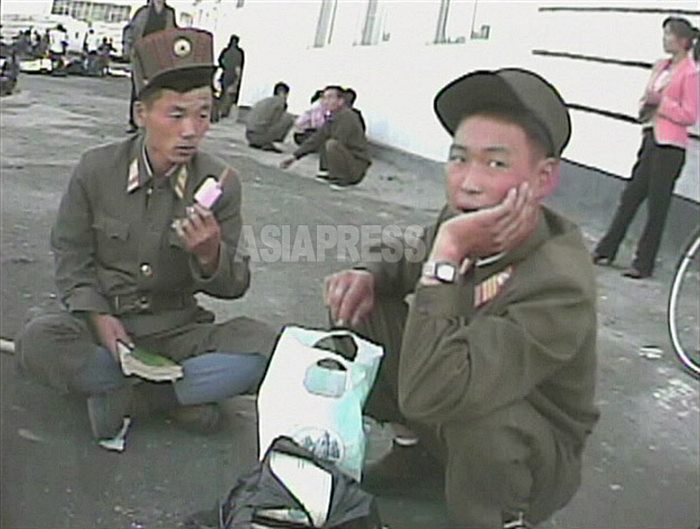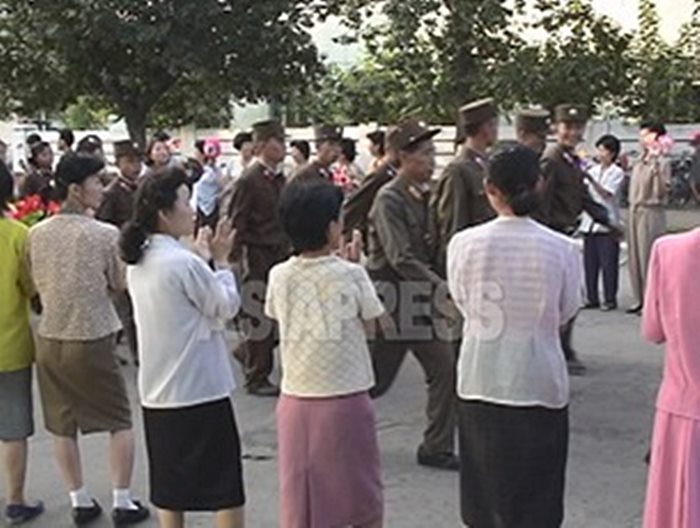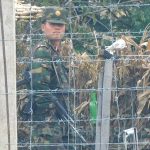
◆ Government encourages students to head into higher-education with offers of exemptions from military service
ASIAPRESS has recently learned that North Korea’s 2023 military service period for men aged 17 and older is eight years, five years for women, and 10 years for personnel in special branches of the military. A reporting partner in North Pyongan Province recently met with a member of the “Military Mobilization Department,” an agency under the Ministry of Defense’s Reserve Forces Division, which handles affairs related to the recruitment of new soldiers. (KANG Ji-won / ISHIMARU Jiro)
North Korea’s military service period started to increase in the 2000s. In 2020, men, who are obligated to join the military, served 13 years, while women, who join the military as volunteers, served eight years according to an ASIAPRESS investigation. Following the mass famine of the late 1990s, the significant decrease in young people joining the military due to an increase in childhood deaths and the falling birthrate led the authorities to fill gaps in recruitment by extending the military service period and encouraging women to join the military.
The Kim Jong-un regime changed its policies regarding military service in 2021. In January of that year, at the Eighth Party Congress of the Workers’ Party of Korea, the regime shortened the military service period for men to eight years and women to five years, a move that dramatically decreased the number of soldiers in military service. Soldiers who had passed their discharge dates were released from military service en masse and redeployed into the agriculture and mining industries, which had been suffering production issues due to lack of labor.
◆ Children of families suffering difficulties can receive exemptions from military service
The “Military Mobilization Department” conducts recruitment efforts at the country’s high schools every year. The Military Mobilization Department staff member who the reporting partner met with in January/February explained the characteristics of this year’s recruitment efforts toward soon-to-be high school graduates:
・The government is encouraging students to continue their education in universities and professional colleges, and those selected – male or female - to continue their studies are exempted from being targets of the Military Mobilization Department’s recruitment efforts.
・The government has ordered that soon-to-be high school graduates from families suffering difficulties are to be exempted from joining the military. Students who are single children or who have relatives who are elderly or unable to work due to illness can also be exempted from joining the military. Some parents or caregivers try as hard as possible to use these exemptions to ensure their children are not recruited into the military.
・Starting from March 1, recruiters begin interviews and physical examinations of candidates, and recruits are given their assignments starting in late March.
・Men are obligated to serve in the military, while woman can volunteer. “Military Mobilization Department” officials go to school classrooms and select female students from among those who want to serve.

◆ Parents think there’s no need to send children to the military if they can’t become party members
“According to the Military Mobilization Department official, life is hard these days so there are a lot of people who have only one child, which has led to a deep shortage in new recruits. Despite the situation being what it is, the upper leadership has instructed that everyone who can study (who is a capable student) should go into higher education,” the reporting partner told ASIAPRESS.
For a long time, most people in North Korea believed that men must go to the military and that it was only natural for college graduates to join the military, too. The biggest reason for this was due to the fact that the path to becoming a Workers’ Party member was only opened after service in the military. Nowadays, however, people’s thinking about the military is undergoing a sea change. The reporting partner gave this explanation:
“These days, there are a lot of parents who do whatever it takes to get their kids into university or professional colleges in order to avoid military service. Starting two years ago, there have been a lot of people who have failed to become party members even after they’ve finished their military service. That’s because the government has made it harder to become a party member. Parents believe that there’s no point in taking the risk of sending their children into the military if they won’t have any chance to become a party member in any case.”
◆ The sons of poor families go to the military
Ordinary North Korean soldiers suffer from severe food shortages. New recruits suffer from malnutrition so commonly it is considered a given. Parents who were worried about their sons or daughters sent in food to military bases or sent money to their children to allow them to buy snacks.
Perspectives toward military service changed after the start of the COVID-19 pandemic, however. Given that urban dwellers began suffering from poverty due to the economic malaise caused by the pandemic, “there have been poor families who believe that sending (their children) to the military is better than suffering at home without food to eat.”
There are a lot of poor families in North Korea, even if they don’t meet the conditions set to exempt certain groups of people from military service. Families with money to spare can have their children avoid military service by sending them to higher-education institutions, but for the children of families without even enough food to put on the table, they are less likely to be able to avoid military service.
◆ Missile bases are popular among new recruits
There have also been changes in what kinds of military units new recruits want to be assigned to. Up until recently, the most popular units included the Ministry of State Security (the secret police), Ministry of Social Security (the national police agency), and the military police. People believed that they would be treated well at these agencies, and could expect to receive an income from bribes. This year, however, the most popular destination among recruits is reportedly missile bases.
“Missile bases treat their personnel really well, and there’s a lot of opportunities to take part in events featuring Kim Jong-un, meaning that missile base personnel can expect to receive gifts from the leadership. Families with money to spare give bribes to the Military Mobilization Department to ensure their children get stationed at these bases.”
Ultimately, bribes determine where a new recruit will be stationed, and assignments are handed down after the end of March.
※ ASIAPRESS communicates with its reporting partners through Chinese cell phones smuggled into North Korea.
- <Inside N. Korea>Authorities begin recruiting poverty-stricken urban dwellers to move to farms with promises of food and housing
- <Emergency Interview> What did you think when you saw Kim Jong-un’s daughter at the military parade? “Nobody thinks that she will become successor”
- <Inside N. Korea>Harsh cold snap in January leads to death toll, with frozen bodies found in fields or inside mud huts…Authorities order closer monitoring of the people in response to rise in wandering people
- <Inside N. Korea>Even high-level cadres mobilized to collect human feces during this year’s “manure battle”…People bring buckets with them when going to the public lavatory
- <Confidential Document>Runaways, suicides and deaths are commonplace in N. Korea’s police detention facilities, leading Kim Jong-un to sign off on measures to punish those in charge



![<PHOTO REPORT>Sino - N.Korea Border [PART1]Things Still Tense in Border River Area After Purge of Jang Song-taek](https://www.asiapress.org/rimjin-gang/wp-content/uploads/2018/07/20140610_r_asiapressNK03X45-150x150.jpg)





















